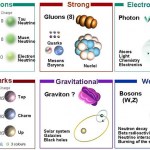Physics
Phillip Ball has a long aggrieved essay about the Many-Worlds Interpretation, which is, as Sean Carroll notes, pretty bad. Ball declares that Many-Worlds is "incoherent, both philosophically and logically," but in fact, he's got this exactly backwards: Many-Worlds is, in fact, a marvel of logical and philosophical coherence, while Ball's objections are incoherent and illogical.
The fundamental problem with Many-Worlds is that every argument about it devolves very quickly into stoner dorm-room bull session nonsense about parallel worlds and identity and morality. But none of that is physics.…
I didn't see this before yesterday's post about Twitter, but over at SciLogs, Kirk Englehardt gets evangelical, offering a very chipper list of "Ten Reasons for Academic Researchers to Use Social Media." I'll just put the item headers here, though each of these has a more complete description, with links to lots of other stuff:
10. You’re in the Driver’s Seat
9. It’s About the Network
8. It’s Newsy and Trendy
7. Promotion (may) = Citations and Downloads
6. Spreading Your Love of Science
5. Setting the Record Straight
4. Sharing Interesting Things
3. Enhancing Your Research
2. It’s Easy
1. It…
“Where you used to be, there is a hole in the world, which I find myself constantly walking around in the daytime, and falling in at night.” -Edna St. Vincent Millay
It's the ultimate dream of many children with time on their hands and their first leisurely attempt at digging: to go clear through the Earth to the other side, creating a bottomless pit.
Image credit: original source unknown.
Most of us don't get very far in practice, but in theory, it should be possible to construct one, and consider what would happen to a very clever test subject who took all the proper precautions,…
The AAAS annual meeting was last week, which apparently included some sessions on social media use. This, of course, led to the usual flurry of twittering about the awesomeness of Twitter, and how people who don't use Twitter are missing out. I was busy with other stuff, so I mostly let it pass, and of course I can't find representative examples now because Twitter.
The truth is, though, Twitter is kind of useless. Or, rather, it's only useful for certain kinds of things-- it's social media, and much more social than media.
So it's a great medium for talking to people you're not physically…
Over at Quantum Progress there was a recent series of guest posts about a social-justice-in-physics curriculum used by high school teacher Moses Rifkin. I sort of glanced at it, said "Huh, that's sort of interesting," and moved on, but this got picked up by some right-wing sites, and exploded. To the point where the awful people on Fox's awful morning show did a segment hating on it.
The angle of attack is, of course, that this is wasting time that ought to be spent on teaching physics. And, you know, I applaud Fox News's sudden concern for the teaching of physics-- if they'd like to have me…
“What we need is more people who specialize in the impossible.” -Theodore Roethke
In math, if you prove a theorem, that theorem is as good as gold. But in physics, a theorem may or may not be 100% valid.
Image credit: Steven Weinberg for Cern Courier, via http://cerncourier.com/cws/article/cern/32522.
It depends, for example, on whether your "proof" describes all the relevant phenomena at play in your system. For example, Goldstone's theorem predicts that any broken symmetry will lead to the creation of massless particles. Yet when we actually break, say, the electroweak symmetry…
Via Curt Rice (or, more precisely, somebody on Twitter who posted a link to that, but I didn't note who) there's a new study in Frontiers in Psychology of the STEM "pipeline", looking at the history of gender disparities in STEM degrees. You can spin this one of two ways, the optimistic one being "Women now continue on from bachelors degrees to Ph.D.'s at the same rate as men!" and the pessimistic one being, well, Rice's post.
The accurate description, as is often the case in social science, "This stuff is really messy and confusing." Rather than being a set of nice straight pipes going from…
We're having a brutal cold snap at the moment, and while today's early-morning dog walk was considerably warmer than yesterday's, it was still 0F/-18C out, which is way colder than I like. When I came back in the house after the walk, my glasses instantly fogged up. But I had to take some stuff outside for the recycling, and within a few seconds of stepping back outside, they cleared right back up.
Now, I knew that would happen (which is why I hadn't bothered to wipe them off inside), but in one of those physicists-are-a-little-weird moments, for the first time, it occurred to me to wonder…
SteelyKid is spending a couple of days this week at "Nerf Camp" at the school where she does taekwondo. This basically consists of a bunch of hyped-up kids in a big room doing martial activities-- taekwondo class, board breaking, and "Nerf war" where they build an obstacle course and then shoot each other with dart guns. Which, of course, required the purchase of upgraded Nerf weaponry, as seen in the "featured image" above.
This thing fires darts at a fearsome speed-- they hit the ceiling with really loud "thwack" that was a huge hit with both kids. Of course, you know what's coming next,…
The final bit of meta-blogging I'll do this weekend is another look at what survives from past years. Unfortunately, when National Geographic took over, they broke our Google Analytics access, so I can't see blog stats from before mid-2012 any more. I do, however, have this old post listing the top posts of 2010, traffic-wise, which serves as a snapshot of what was popular at the time. It's interesting to see how this compares to the current list of top posts from 2010-- the approximate rank of 2010 posts based on traffic in 2014 is in parentheses:
A Lot of Knowledge Is a Dangerous Thing (…
Continuing the weekend theme of meta-blogging, one of the questions I've occasionally wondered about in doing top-posts lists for a given year is the problem of a bias against recency-- that is, that posts put up toward the end of the year are inherently at a disadvantage because they've had less time to integrate up the slow trickle of traffic that every page on the Internet gets. Obviously, this isn't a question that can be answered by data from 2014, but I have access to traffic stats back to mid-2012, so I can look at data for 2013. So, these are the top posts I put up in 2013 in terms of…
As a follow-up to yesterday's post about what draws the most traffic here, I went through and pulled out the top 20 posts from the blog (by traffic) for the calendar year 2014 that were first published in 2014. Numbers after the links are the fraction of the total pageviews for the year that each of these drew, according to Google Analytics:
"Earthing" Is a Bunch of Crap 1.03%
Tennis Ball Plus Soccer Ball Equals Blown Minds 0.65%
Impossible Thruster Probably Impossible 0.55%
Quick Interstellar Thoughts 0.54%
What Is Color? 0.52%
The Physics of Crazy Sleds 0.45%
Method and Its Discontents 0.…
When I was writing up the state of blogging post last weekend, I thought about pulling together a Top Ten Posts thing, but didn't have time. also, Google analytics moved a bunch of stuff since the last time I used it, so I had a hard time locating the right options. Having tracked it down, though, I give you the ten highest-traffic blog posts from 2014, with the year of posting in parentheses, and the fraction of the total pageviews for the year that the post racked up, according to Google Analytics:
How Do I Kill the Squirrels who Are Eating My Car? (2010) 15.2%
Why Does Excel Suck so Much…
Rhett Allain has a list of 5 Things Every Human Should Know About Light, to tie in with the International Year of Light, and it's a good list with lots of .gifs. Of course, there are some gaps, so let me offer some additional things that everyone ought to know about light:
-- Light Is a Particle
Rhett and I have a long-running argument about the use of photons in introductory physics; he's against them for reasons that make no sense to me. To my mind, it is unquestionably true that light has particle-like properties (and here's a follow-up with some math), and that's a thing that everybody…
Greg Laden reports on a hominid fossil "recovered from the seabed near Taiwan" which reveals new levels of dental diversity among proto-humans and may qualify as a new species. Greg says the specimen known as Penghu "is yet another indicator that multiple different hominids lived on the Earth at the same time after the rise of Homo erectus." But why was it located underwater? In another example of what lies beneath, Dr. Dolittle marvels at "an unexpected find and very exciting moment for researchers;" the discovery of small fish and invertebrates thriving below 740 meters of ice near the…
(When I launched the Advent Calendar of Science Stories series back in December, I had a few things in mind, but wasn’t sure I’d get through 24 days. In the end, I had more than enough material, and in fact didn’t end up using a few of my original ideas. So I’ll do a few additional posts, on an occasional basis, to use up a bit more of the leftover bits from Eureka: Discovering Your Inner Scientist…)
While Eureka is built around stories, it's really a book about the process of science, using those stories to highlight particular aspects of the scientific process. The hope is that making the…
No, not the little cover .jpg that I use as the "featured image" to tag these posts promoting Eureka. The post title refers to the Big Picture Science radio show from the SETI insitute. I'm one of the people interviewed in the latest episode, Maria Konnikova (author of Mastermind) and Louis Liebenberg.
This is another interview that was recorded remotely down at WAMC in Albany. They pushed back on my stock answers a little more than usual, which in one sense was fun, but was also pretty exhausting, as I was at the lowest point of the cold I'm just getting over now. I went home right after it…
I've done yet another piece for The Conversation, this one expanding on something I've been saying in interviews promoting Eureka: that knowing the process of science can help people sort good science from bad. In this particular case, I take the somewhat #slatepitch-y angle that the recent high-profile unraveling of the BICEP2 experiment's claim to detect primordial gravitational waves is a good thing:
Along with general disappointment, the new announcement has prompted discussion of what, if anything, the BICEP2 team did wrong. Many commentators fault them for over-hyping their results to…
“The joy of life consists in the exercise of one’s energies, continual growth, constant change, the enjoyment of every new experience. To stop means simply to die. The eternal mistake of mankind is to set up an attainable ideal.” -Aleister Crowley
Our Universe is the way it is for two reasons: the initial conditions that it started off with, and the fundamental particles, interactions and laws that govern it.
Image credit: NASA / CXC / M.Weiss.
When it comes to the physical properties of everything that exists, we can ask ourselves how many fundamental, dimensionless constants or…
(When I launched the Advent Calendar of Science Stories series back in December, I had a few things in mind, but wasn’t sure I’d get through 24 days. In the end, I had more than enough material, and in fact didn’t end up using a few of my original ideas. So I’ll do a few additional posts, on an occasional basis, to use up a bit more of the leftover bits from Eureka: Discovering Your Inner Scientist…)
While we mostly think of science being done in comfortable institutes if not gleaming laboratories, one of the most impressive and inspiring things about science is that people can and do carry…






